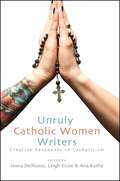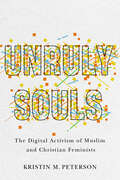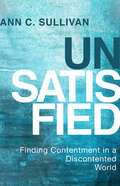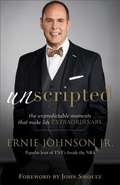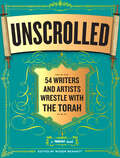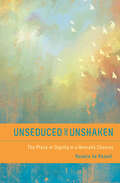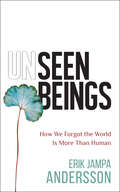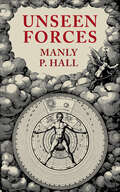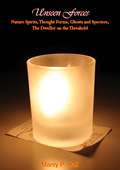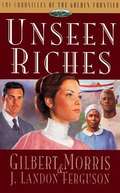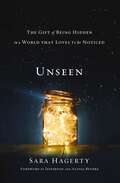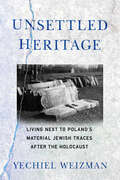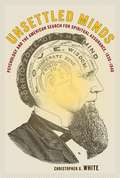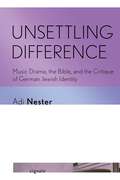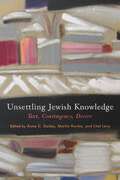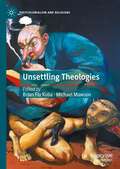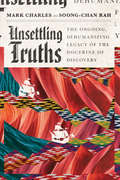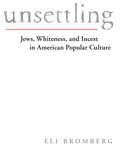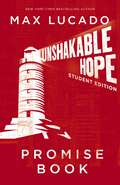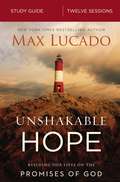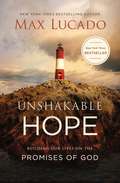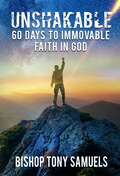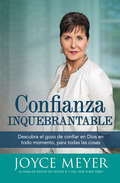- Table View
- List View
Unruly Catholic Women Writers: Creative Responses to Catholicism (Excelsior Editions)
by Jeana DelRosso; Leigh Eicke; Ana KotheFinalist for the 2013 ForeWord IndieFab Book of the Year Award in the Anthologies CategoryThis unique literary anthology is devoted to unruly Catholic women. In short stories, poems, personal essays, and drama, the contributors describe women's struggles with Catholicism and also complicate contemporary understandings of women's relationships to their faith. Catholicism often oppresses the women in these creative pieces, but it also inspires them to challenge literary, social, political, and religious hierarchies. The collection reflects the considerations of a wide range of women from a variety of ethnic backgrounds, geographic locations, and generations; they encompass the gamut of reactions to the Catholic experience—humor, anger, nostalgia, critique, appreciation, and engagement or rejection on one's own terms. Authors address real life versus Catholic dogma, motherhood, childhood, alienation from the Church, Catholic school days, mentors and exemplary figures, Church strictures on women's sexualities, and leaving or remaining in the Church among many other experiences. Readers will find this a rich and multifaceted exploration, one that offers new perspectives and moments of recognition.
Unruly Souls: The Digital Activism of Muslim and Christian Feminists
by Kristin M. PetersonAmid growing digital activism to address gender-based violence, institutional racism, and homophobia in U.S. society, Unruly Souls explores the intersectional feminist activism among young people within Islam and Evangelical Christianity. These religious misfits—marginalized from traditional religious spaces due to their sexuality, gender, or race—employ the creative tactics of digital media in their work to seek justice and to display their fundamental equality in the eyes of God. Through an analysis of various digital projects from hip-hop music videos and Instagram accounts to Twitter hashtags and podcasts, Kristin Peterson argues that the hybrid, flexible, playful, and sensory nature of digital media facilitate intersectional feminist activism within and beyond religious communities. Drawing on work from queer theory, decolonial theory, and Black feminist theory, this study explores how those who have been marginalized are able to effectively deploy their disregarded status along with digital media tactics to cultivate empathetic communities for those recovering from religious trauma.
Unsatisfied: Finding Contentment in a Discontented World
by Ann C. SullivanIn Unsatisfied: Finding Contentment in a Discontented World, Ann C. Sullivan sorts through the reasons for our frustrations – Drama, Judgement, Fear, and Comparison – and leads readers on a path to genuine contentment through Hope, Purpose, and Fulfillment. Unsatisfied dares readers to believe that God is closer than you think, sorts through the reasons for unhappiness and frustrations, helps define fulfillment, and leads readers to find genuine contentment. Unsatisfied: • Unravels our cultural definition of fulfillment. • Identifies the empty spaces the comparison game leaves behind. • Connects the dots that lead to genuine contentment. "In Unsatisfied: Finding Contentment in a Discontented World, Ann C. Sullivan accomplishes something I wish could be taught yet fear that it can’t: She writes an in-your-face book about a deeply difficult subject, yet she avoids preaching. Rather, Ann takes a come-alongside approach and shares her life, warts and all, revealing what she’s learned and how she’s grown—allowing us to apply the morals and principles for ourselves. It’s a work of art." Jerry B. Jenkins Novelist & Biographer | The Jerry Jenkins Writers Guild "With refreshing humor and insight, Ann skillfully weaves together the current issues of life and the timeless principles of scripture. She points to all the things we should be grateful for and the disappointments that keep us from celebrating. If you’re ready for an honest look at our struggle and the practical solutions that are available, you’ll want to pick up Ann C. Sullivan’s book, Unsatisfied." Leslie Strobel Co-author of Spiritual Mismatch
Unscripted: The Unpredictable Moments that Make Life Extraordinary
by John Smoltz Ernie JohnsonErnie Johnson Jr. has been in the game a long time. With one of the most recognized voices in sports broadcasting, he is a tireless perfectionist when it comes to preparing and delivering his commentary. Yet he knows that some of sports' greatest triumphs--and life's greatest rewards--come from those unscripted moments you never anticipated. In this heartfelt, gripping autobiography, the three-time Sports Emmy Award-winner and popular host of TNT's Inside the NBA provides a remarkably candid look at his life both on and off the screen. From his relationship with his sportscaster father to his own rise to the top of sports broadcasting, from battling cancer to raising six children with his wife, Cheryl, including a special needs child adopted from Romania, Ernie has taken the important lessons he learned from his father and passed them on to his own children. This is the untold story, the one Ernie has lived after the lights are turned off and the cameras stop rolling. Sports fans, cancer survivors, fathers and sons, adoptive parents, those whose lives have been touched by a person with special needs, anyone who loves stories about handling life's surprises with grace--Unscripted is for all of these.
Unscrolled: 54 Writers and Artists Wrestle with the Torah
by Roger BennettAnnouncing a smart, daring, original new take on the Torah. Imagine: 54 leading young Jewish writers, artists, photographers, screenwriters, architects, actors, musicians, and graphic artists grappling with the first five books of the Bible and giving new meaning to the 54 Torah portions that are traditionally read over the course of a year. <P><P> From the foundational stories of Genesis and Exodus to the legalistic minutiae of Leviticus, Numbers, and Deuteronomy, Unscrolled is a reinterpreting, a reimagining, a creative and eclectic celebration of the Jewish Bible. <P><P>Here’s a graphic-novel version of Moses receiving the Ten Commandments, by Rebecca Odes and Sam Lipsyte. Lost creator Damon Lindelof writing about Abraham’s decision to sacrifice his son. Here’s Sloane Crosley bringing Pharaoh into the 21st century, where he’s checking out “boils,” “lice,” and “plague of frogs” on WebMD. Plus there’s Joshua Foer, Aimee Bender, A. J. Jacobs, David Auburn, Jill Soloway, Ben Greenman, Josh Radnor, Adam Mansbach, and more. <P><P>Edited by Roger Bennett, a founder of Reboot, a network of young Jewish creatives and intellectuals, Unscrolled is a gathering of brilliant, diverse voices that will speak to anyone interested in Jewish thought and identity—and, with its singular design and use of color throughout, the perfect bar and bat mitzvah gift. First it presents a synopsis of the Torah portion, written by Bennett, and then the story is reinterpreted, in forms that range from the aforementioned graphic novel to transcripts, stories, poems, memoirs, letters, plays, infographics, monologues—each designed to give the reader a fresh new take on some of the oldest, wisest, and occasionally weirdest stories of the Western world, while inspiring new ideas about the Bible and its meaning, value, and place in our lives.
Unseduced and Unshaken: The Place of Dignity in a Woman's Choices
by Rosalie De RossetYou can&’t afford to live casually, haphazardly. No matter your age, you were born into a plethora of expectations of what it means to be a woman. How easily we assume impoverished views of womanhood as we hoist beauty and desirability above the more enduring traits of self-possession and dignity. We tend to live as divided and distracted selves, allowing our bodies and minds to drift to opposite poles while swapping our pursuit of God for tamer, lesser loves. This collection of essays is more than a call to modesty or chastity. It is a thoughtful provocation to speak well, read often, make choices that reflect the character of God, and even to establish a theology of play or leisure. Being intentional with your choices, cultivating your intellect, and taking seriously your voice determines not only what kind of person you are, but also what kind of woman you will be. &“[Unseduced and Unshaken] raises the bar for young Christian women...It&’s a call for all Christian women to examine their personal faith presuppositions, deliberately choose a life of Biblical &‘dignity,&’ and to not be frightened to allow &‘theology to inform our choices.&’&” Just Between Us, Summer 2013 issue
Unseduced and Unshaken: The Place of Dignity in a Woman's Choices
by Rosalie De RossetYou can&’t afford to live casually, haphazardly. No matter your age, you were born into a plethora of expectations of what it means to be a woman. How easily we assume impoverished views of womanhood as we hoist beauty and desirability above the more enduring traits of self-possession and dignity. We tend to live as divided and distracted selves, allowing our bodies and minds to drift to opposite poles while swapping our pursuit of God for tamer, lesser loves. This collection of essays is more than a call to modesty or chastity. It is a thoughtful provocation to speak well, read often, make choices that reflect the character of God, and even to establish a theology of play or leisure. Being intentional with your choices, cultivating your intellect, and taking seriously your voice determines not only what kind of person you are, but also what kind of woman you will be. &“[Unseduced and Unshaken] raises the bar for young Christian women...It&’s a call for all Christian women to examine their personal faith presuppositions, deliberately choose a life of Biblical &‘dignity,&’ and to not be frightened to allow &‘theology to inform our choices.&’&” Just Between Us, Summer 2013 issue
Unseen Beings: How We Forgot the World Is More Than Human
by Erik Jampa Andersson'Unseen Beings is a magnificent, passionate, brilliantly written manifesto for our urgent reimagining of our relationship with every aspect of the creation… indispensable reading for anyone who longs for a just and balanced human future. Buy it and give it to everyone you know.' Andrew Harvey, author of The Hope A revolutionary perspective on the climate catastrophe bridging history, philosophy, science, and religion.You&’ve heard the hard-hitting data and you&’ve seen the documentaries. But what will it truly take for humanity to change? We will not tackle the climate catastrophe with data alone – we need new stories and new ways of seeing and thinking.By drawing on traditional eco-philosophies and Buddhist wisdom, Erik Jampa Andersson offers an approach to our environmental emergency that will make us rethink the very nature of our existence on this incredible planet. Looking at the climate catastrophe through the framework of disease, Unseen Beings examines our ecological diagnosis, its historical causes and conditions and, crucially, its much-needed treatment, as well as exploring:how and why we constructed a human-centric worldview amazing recent discoveries around non-human intelligencehow religious traditions have dealt with questions of nature, sentience and ecologycritical connections between human health and environmental healthThis book is a call to action. Climate anxiety has left many of us feeling confused and powerless, but there is another way. If we can recover our natural sense of enchantment and kinship with non-human beings, we may still find a path to build a better future.
Unseen Forces
by Manly Palmer HallWritten by famed lecturer Manly Hall, Unseen Forces is your guide to the secrets of nature spirits, though forms, phantoms and apparitions, and the enigmatic dweller that guards the boundaries between realms. Prepare to embark on a mystical journey like no other.
Unseen Forces: Nature Spirits, Thought Forms, Ghosts and Specters, The Dweller on the Threshold
by Manly P. HallThis book by Canadian-born mystical writer Manly P. Hall comprises of a series of lectures on nature spirits, thought forms, ghosts and specters, the dweller on the threshold.This compilation was first published in 1924.
Unseen Riches (Chronicles of the Golden Frontier #2)
by Gilbert Morris J. Landon FergusonShe's overcome the challenges of widowhood, poverty, and newspaper publishing. Now if she can only settle the conflict within her heart. With high hopes of the adventure to come, Jennifer DeSpain, along with her family and friends, is embarking on a journey that will change their lives forever. Abandoning the comforts of their home and well-established newspaper, they head east to Colorado. But when the train comes to an abrupt stop, the adventure is just beginning. The Kissing Bandit strikes again--stealing both her money and a kiss Determined to overcome this loss, Jennifer and her editor, Jason, manage to print the first issues of their new paper. Life is improving until Jason suffers a terrible accident, which forces Jennifer to run the paper herself. Overwhelmed with despair and frustration at the uncooperative press, Jennifer is on the verge of quitting--until two men enter their lives who must be heaven-sent. Preacher brings truth and miracles. And with an eye on Jennifer, the handsome rancher Lance Rivers insists on taking care of them. Adored by everyone except a bitter and jealous Jason, Lance seems the perfect addition to their family. Can he be the one who Jennifer can finally trust with her heart?
Unseen: The Gift of Being Hidden in a World That Loves to Be Noticed
by Sara Hagerty Jefferson and Alyssa BethkeEvery heart longs to be seen and understood. Yet most of our lives is unwitnessed. We spend our days working, driving, parenting. We sometimes spend whole seasons feeling unnoticed and unappreciated. So how do we find contentment when we feel so hidden?In Unseen, Sara Hagerty suggests that this is exactly what God intended. He is the only One who truly knows us. He is the only One who understands the value of the unseen in our lives. When this truth seeps into our souls, we realize that only when we hide ourselves in God can we give ourselves to others in true freedom—and know the joy of a deeper relationship with the God who sees us.Our culture applauds what we can produce, what we can show, what we can upload to social media. Only when we give all of ourselves to God—unedited, abandoned, apparently wasteful in its lack of productivity—can we live out who God created us to be. As Hagerty writes, “Maybe my seemingly unproductive, looking-up-at-Him life produces awe among the angels.”Through an eloquent exploration of both personal and biblical story, Hagerty calls us to offer every unseen minute of our lives to God. God is in the secret places of our lives that no one else witnesses. But we’ve not been relegated to these places. We’ve been invited.We may be “wasting” ourselves in a hidden corner today: The cubicle on the fourth floor. The hospital bedside of an elderly parent. The laundry room. But these are the places God uses to meet us with a radical love. These are the places that produce the kind of unhinged love in us that gives everything at His feet, whether or not anyone else ever proclaims our name, whether or not anyone else ever sees.God’s invitation is not just for a season or a day. It is the question of our lives: “When no one else applauds you, when it makes no sense, when you see no results—will you waste your love on Me?”
Unsettled Heritage: Living next to Poland's Material Jewish Traces after the Holocaust
by Yechiel WeizmanIn Unsettled Heritage, Yechiel Weizman explores what happened to the thousands of abandoned Jewish cemeteries and places of worship that remained in Poland after the Holocaust, asking how postwar society in small, provincial towns perceived, experienced, and interacted with the physical traces of former Jewish neighbors.After the war, with few if any Jews remaining, numerous deserted graveyards and dilapidated synagogues became mute witnesses to the Jewish tragedy, leaving Poles with the complicated task of contending with these ruins and deciding on their future upkeep. Combining archival research into hitherto unexamined sources, anthropological field work, and cultural and linguistic analysis, Weizman uncovers the concrete and symbolic fate of sacral Jewish sites in Poland's provincial towns, from the end of the Second World War until the fall of the communist regime. His book weaves a complex tale whose main protagonists are the municipal officials, local activists, and ordinary Polish citizens who lived alongside the material reminders of their murdered fellow nationals. Unsettled Heritage shows the extent to which debating the status and future of the material Jewish remains was never a neutral undertaking for Poles—nor was interacting with their disturbing and haunting presence. Indeed, it became one of the most urgent municipal concerns of the communist era, and the main vehicle through which Polish society was confronted with the memory of the Jews and their annihilation.
Unsettled Minds: Psychology and the American Search for Spiritual Assurance, 1830–1940
by Christopher G. WhiteThe book examines the concept of religion by turning to the religious lives of nineteenth- and twentieth-century Americans who rejected older religious traditions and turned to scientific psychologies to help them formulate new ideas about the self and new practices concerning spiritual growth.
Unsettling Difference: Music Drama, the Bible, and the Critique of German Jewish Identity (Signale: Modern German Letters, Cultures, and Thought)
by Adi NesterUnsettling Difference challenges the major-minor pattern that has framed discussions of German Jewish difference, focusing on instances that fall outside traditional understandings of minority culture. Exploring expressions of Jewish identity and difference in biblical-themed musical dramas and their literary sources, Adi Nester argues that the issue of Jewish difference should be treated as an aesthetic question in the first half of the twentieth century, even amid the rise of pseudoscientific theories about race and blood.Drawing on the fraught, parallel histories of opera and the modern reception of the Hebrew Bible in Germany, both significant in debates at the time about the nature of Jewish separateness, Unsettling Difference shows how this discourse troubles concepts of Jewish marginality and (non-Jewish) German dominance. Through innovative readings of key works in this tradition—Rudolf Borchardt's poem, Das Buch Joram; Paul Ben-Haim's oratorio, Joram; Arnold Schoenberg's opera, Moses und Aron; Joseph Roth's novel, Hiob; and Eric Zeisl's opera, Hiob—Nester shows how these biblical adaptations foreground alternative notions of difference that rely on confusion, ambiguity, radical heterogeneity, excess, and repetition.
Unsettling Jewish Knowledge: Text, Contingency, Desire (Jewish Culture and Contexts)
by Anne C. Dailey, Martin Kavka, and Lital LevySpanning the fields of literature, history, philosophy, and theology, Unsettling Jewish Knowledge adopts a fresh approach to the study of Jewish thought and culture. By creatively foregrounding the role of emotions, senses, and the imagination in Jewish experience, the book invites readers to consider what it means for Jewish identity and experience to be constituted outside the frameworks of reasoned thought and inquiry. The collection’s eight essays offer innovative and provocative approaches to a diverse array of topics including modern Jewish-Christian relations, the book of Isaiah, contemporary Jewish fiction, and philosophical meditations on Jewish law. Their bold interpretations of Jewish texts and histories are centered on questions of faith, loss, prejudice, and enchantment—and the darker implications of these questions. The book’s essays also illuminate the importance of desire as a key motivating force in the pursuit of knowledge. Weaving together insights from several disciplines, Unsettling Jewish Knowledge challenges us to grapple with the unexpected, the unconventional, and the uncomfortable aspects of Jewish experience and its representations.Contributors: Anne C. Dailey, John Efron, Yael S. Feldman, Galit Hasan-Rokem, Martin Kavka, Lital Levy, Shaul Magid, Eva Mroczek, Paul E. Nahme, Eli Schonfeld, Shira Stav.
Unsettling Theologies: Memory, Identity, and Place (Postcolonialism and Religions)
by Michael Mawson Brian Fiu KoliaHow can we understand and respond to past and present entanglements of Christianity with colonisation? What kinds of theological perspectives and approaches are needed in the wake of colonisation and its impact? Unsettling Theologies includes responses to these questions from Aboriginal, Māori, Pasifika and White scholars.
Unsettling Truths: The Ongoing, Dehumanizing Legacy of the Doctrine of Discovery
by Soong-Chan Rah Mark CharlesYou cannot discover lands already inhabited.
Unsettling: Jews, Whiteness, and Incest in American Popular Culture
by Eli BrombergBy analyzing how various media told stories about Jewish celebrities and incest, Unsettling illustrates how Jewish community protective politics impacted the representation of white male Jewish masculinity in the 1990s. Chapters on Woody Allen, Roseanne Barr, and Henry Roth demonstrate how media coverage of their respective incest denials (Allen), allegations (Barr), and confessions (Roth) intersect with a history of sexual antisemitism, while an introductory chapter on Jewish second-wave feminist criticism of Sigmund Freud considers how Freud became “white” in these discussions. Unsettling reveals how film, TV, and literature have helped displace once prevalent antisemitic stereotypes onto those who are non-Jewish, nonwhite, and poor. In considering how whiteness functions for an ethnoreligious group with historic vulnerability to incest stereotype as well as contemporary white privilege, Unsettling demonstrates how white Jewish men accused of incest, and even those who defiantly confess it, became improbably sympathetic figures representing supposed white male vulnerability.
Unshakable Hope Promise Book
by Max LucadoGet to know the God who keeps His promises. Unshakable Hope Promise Book, by bestselling author Max Lucado, explores the promises God made to His people throughout the Bible and how they are relevant to your life today. Get ready to discover the amazing plans and promises God has just for you!What would you do tomorrow if you had no fear? How would you live your life if you knew that the promises in the Bible are for you? What if God Himself put promises there meant for you and has an amazing plan for your life?In Unshakable Hope Promise Book: Student Edition, Max Lucado shows you how God has kept His promises in the lives of His people for all of history. Using examples from biblical characters and current examples from teens like you, Max will help you explore and understand the ways God has kept His promises then and how He keeps them now.Embrace an exciting faith-filled life as you work through stories, Scripture, and journaling questions in Unshakable Hope Promise Book.
Unshakable Hope Study Guide: Building Our Lives on the Promises of God
by Max LucadoThis 12-session video Bible study will help you, your group, and your church stand on the definitive declarations of our mighty and loving God who governs the world according to his great and precious promises.This world has a tremble to it. There are things that seem unsteady in this life. But when we belong to God, it allows us to filter our problems through the promises of God. When we choose to be people of the promise, we choose to build our lives on the promises of God, not the circumstances of life.The stories of the men and women in Scripture were different, but the theme was the same: they were People of the Promise. Because of God’s promises, Noah built an ark on dry land, Joshua claimed the Promised Land, David became king, Peter preached the first sermon, and John caught a glimpse of the future. Like them, we can also build our lives on God’s promises, and trust him to keep them.This study guide includes tools for personal study and reflection, video notes, and questions for group discussion.Sessions include:You Are Stamped with God’s ImageGod Will Win the VictoryYou Are an Heir of GodYour Prayers Have PowerGod Gives Grace to the HumbleGod Gets YouJesus Is Praying for YouDeath Has Been DefeatedJoy Is Coming SoonYou Will Have PowerThere Is No Condemnation in ChristJustice Will PrevailDesigned for use with the Unshakable Hope Video Study (9780310092117), sold separately.
Unshakable Hope: Building Our Lives on the Promises of God
by Max LucadoWhat is shaking in your world? Possibly your future, your faith, your family, or finances? It's a shaky world out there. In Unshakable Hope: Building Our Lives on the Promises of God, pastor and New York Times bestselling author Max Lucado offers encouraging guidance for overcoming sadness and despair, renewing a sense of purpose, and triumphantly facing the fears of the future.We’ve never been more educated and entertained. We have technological tools our parents could only dream of, and we are saturated with information, amusement, and recreation. Yet more than ever, we are starving for hope. School shootings are all too familiar. Depression is on the rise. And more people than ever are orchestrating their own deaths. In America alone, the suicide rate has increased 24 percent in fewer than twenty years. If a disease saw such a spike, it would be deemed an epidemic. People are dying from a lack of hope.After forty years of counseling and ministry, Max Lucado has learned that nothing lifts the desperate, weary heart like the promises of God. In a world full of despair, depression, anxiety, and instability, we do not need more opinions or hunches; we need the definitive declarations of our mighty and loving God. Unshakable Hope examines twelve of God’s promises that Max has turned to over the years to encourage himself and others. Each chapter explores one significant promise and reveals how it will equip you to:Overcome challenging circumstancesLive through sadness and renew hopeExperience lasting securityMake wise decisions What is your life built on—the circumstances of life or the promises of God? The answer to that question changes everything. For every problem in life, God has given you a promise. Join Max as he takes a closer look at Scripture’s unbreakable promises and shows you how to live with an unshakable hope.
Unshakable Hope: Building Our Lives on the Promises of God
by Max Lucado*NEW YORK TIMES BESTSELLER* What feels shaky in your world? Are you overwhelmed by the problems you’re facing or the pain you’re feeling?Maybe you feel hurt by the past. Disappointed by the present. Worried about the future. If so, you are not alone, but there is hope. You can live with security and purpose.In Unshakable Hope, Max Lucado unpacks 12 of the Bible’s most significant promises, equipping you to overcome difficult circumstances by keeping your focus on the hope found in the promises of Scripture rather than dwelling on the problems in front of you.For every problem in life, God has given you a promise.Hope is hard to come by these days. Whether it’s heart disease or cancer, job failure or addiction, natural disasters or family disasters, mass murders or mental illness, there are so many reasons to be overwhelmed.In a world full of instability, we do not need more opinions or hunches; we need the definitive declarations of our mighty and loving God.What is your life built on—the circumstances of life or the promises of God? The answer to that question changes everything. Join Max as he takes a closer look at Scripture’s unbreakable promises and shows you how to live with unshakable hope.
Unshakable: 60 Days to Immovable Faith in God
by Tony Samuels"Be strong and of good courage; do not be afraid, nor be dismayed, for the LORD your God is with you wherever you go." ~Joshua 1:9 (NKJV)Let the redeemed of the Lord rise up with the Word of God and in the strength of Holy Spirit fire.Now is the time to take a bold stand for the freedom Jesus died for, to solidify your understanding of who you are created to be, to not shrink back, and not be shaken.Bishop Tony Samuels takes you on a 60-day journey to immovable faith in Christ Jesus. No matter the world's state, your situation, or circumstance in life, God has truly made you unshakable.Let’s get started!About the Author:Bishop Tony Samuels is the President of Lighthouse Gospel Mission. He, along with his wife, Bishop Jeannette Samuels, co-pastor Lighthouse Freedom Center, in Riverview, Florida.
Unshakeable Trust: Find the Joy of Trusting God at All Times, in All Things
by Joyce MeyerIn her new book, New York Times bestselling author Joyce Meyer explores a life lived in complete and total dependence on God. Drawing on her own experiences and inspiration from the Word of God, Joyce makes the case that in every area of your life--spiritually, relationally, emotionally, financially--you can trust that God has your very best in store. With each new chapter, Joyce unveils a sovereign and trustworthy God who longs to be in a relationship with his people, and inspires you to tear down the walls of self-reliance. This book will both equip and encourage, as you learn how to "trust in the Lord with all your heart and lean not on your own understanding." Regardless of your past pain, your present circumstances, or your future uncertainty, when you learn to trust God each day, you'll experience the joy-filled life Jesus came to give you. Others may have let you down . . . but God never will!
